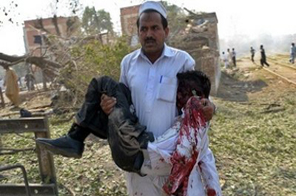Pak troops thrust towards Taliban
PESHAWAR: Pakistani ground troops backed by warplanes and army gunships thrust towards Taliban bastions in South Waziristan on Saturday ahead of an all-out assault against the militants, officials said.
The mountainous region is in the border region with Afghanistan that US officials call the most dangerous place in the world and a stronghold for Pakistani Taliban chief Baitullah Mehsud, who was killed in a US drone attack.
Fighter jets and helicopter gunships have bombed Taliban positions for months as commanders finetuned plans for a ground offensive, which is expected to encounter heavy resistance on terrain well suited to the guerrillas.
Saturday's thrust follows a spike in a two-year Taliban and Al-Qaeda-linked campaign of attacks, leaving 170 people dead so far this month and cementing Pakistan's position on the frontline of the US-led war on Islamic militants.
"Forces are moving inside Mehsud territory. Initially we have moved not full strength but some forces to establish foot holds," a senior military official told AFP in northwest Pakistan.
The official said three divisions of the military, paramilitary and police would be mobilised, eventually numbering up to 60,000 troops, to spearhead a lightning campaign before winter set in.
"Troops from neighbouring Tank district and Dera Ismail Khan have already been moved towards Waziristan," a Pakistani intelligence official said.
Another military official in Peshawar confirmed that ground troops were moving towards Taliban strongholds in the vast district where experts estimate the Tehreek-e-Taliban (TTP) movement has 20,000 to 25,000 fighters.
Security officials said an announcement on the formal launch of the operation would be made by Pakistani Prime Minister Yousuf Raza Gilani.
Pakistani jet fighters and helicopter gunships were in action Saturday as ground troops were moving in, stepping up a bombing campaign that has continued for months in a bid to "soften up" targets ahead of a ground offensive.
Roadside bomb attacks against military convoys killed three soldiers -- two in North Waziristan and one in South Waziristan -- on Saturday but it was not immediately clear whether troops on the move were coming under fire.
"It will be a very swift operation bearing in mind the weather conditions. Soon there will be a complete change in the weather and maybe snowfall. We will try to complete it before snowfall," said the military official.
"Ground and air forces are moving. The objective is to clear all kinds of miscreants from South Waziristan," Tariq Hayat, a senior government official in Pakistan's semi-autonomous tribal belt, told AFP, referring to the militants.Related article: Militant groups in Pakistan
"This has been in the works for a long time. It was only a question of timing and the timing was decided. Troops were in place and they moved in."
The troop movement was accompanied by an indefinite curfew slapped on parts of South Waziristan from 7:00 am in the district of Wana, the main town in the vast and lawless region, as well as in Shakai and Tiarza, officials said.
Pakistan vowed Friday to root out militants, branding Islamist extremists a threat to national sovereignty following crisis talks chaired by the prime minister and a briefing from army chief General Ashfaq Pervez Kayani.
"The recent upsurge of terror incidents in the country were condemned and it was agreed that these elements pose a serious threat to the sovereignty and integrity of the state," said the prime minister's office.Chronology: 11 days of violence
"In the given circumstances, the national consensus is reaffirmed to establish and maintain the writ of the state to weed out these elements."
On Thursday, gunmen blasted into three security buildings in Lahore, in the country's political heartland, five days after attackers besieged the army headquarters near the capital Islamabad and humiliated the military.
The frequency and sophistication of a string of attacks since October 5 has underscored the weakness of government security forces.
"You don't have to make statements about launching an offensive in advance. It should be swift and a surprise," said analyst Hasan Askari.






